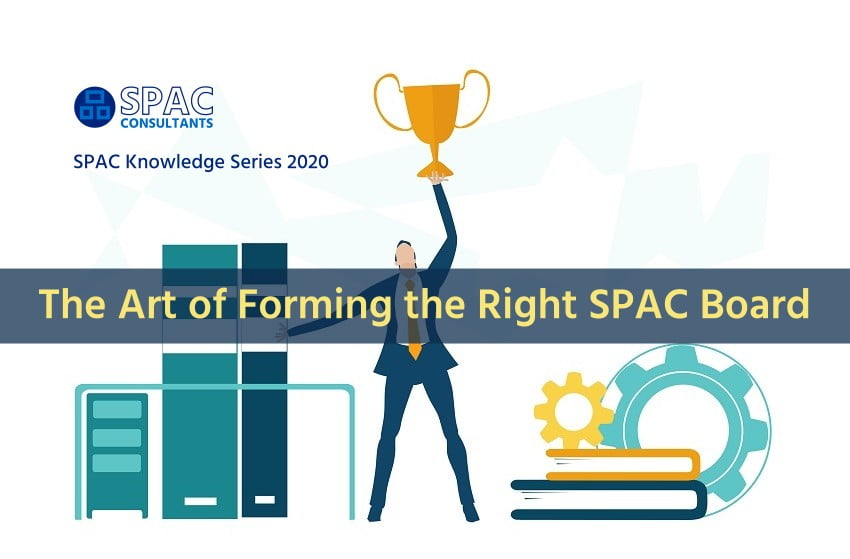The Importance of SPAC Boards
It is the SPAC board that convinces IPO investors to provide their funds
The Right Board
Who is an Ideal SPAC Board Member?
Special Purpose Acquisition Companies (SPACs) are incubators for competitive businesses that buy private companies and make them available to the public markets. To form and run a SPAC, great minds are required on the board of directors. The process of buying private companies with a SPAC can be nuanced, and the right people on the board of the SPAC is a prerequisite to success.

SPAC Management Teams – SPAC Boards
SPAC Management Teams typically consist of at least five people: a CEO, a CFO, and three independent Board members. Strictly speaking, the CEO and the CFO are officers. They may or may not be members of the SPAC Board.
In this article, when we say Board, we mean the entire SPAC Management Team, whether the officers are board members or not.
SPACs are Built to Buy Companies
In broad strokes, SPACs are simple. In reality, the process of running a SPAC from its inception and buying private companies is complex and needs to be handled by professionals with deep experience in the public markets and the targeted industry.
When a SPAC is being created, the selection of the board members is one of the most vital components of the process. Here are some of the things that a SPAC board member needs to bring to the table so that the SPAC has competent people guiding its direction.
Competency: Managing Public Companies
The CEO and CFO of the SPAC need to be well versed in any laws and regulations that apply to a public company. Although SPACs may have a smaller number of board members than many publicly listed companies, all the same rules still apply.
In addition to fluency in the regulatory framework, board members must be accustomed with laws specifically regarding SPACs, their structure and operations. Knowing how to navigate the regulatory environment is key, as is understanding how the acquisition process works with a SPAC.
A board member will be directly involved throughout the acquisition process and will need to know how to interface with both the target company, and the institutional investors who have capital invested in the SPAC. All of these factors are considerations for a SPAC board member, and there are others to consider as well.
Knowledge of the Target Sector
At the time of a SPAC’s formation, its prospectus will include an acquisition strategy. This strategy can be very specific or drafted to be broad enough to pursue a range of target companies in a given sector, or even many sectors.
Part of the value that a SPAC offers resides within its acquisition strategy, and this highlights the importance of a board member with a deep understanding of the target market sector. A good candidate for a SPAC board will understand how to unlock value in the target sector, and also already understand where undervalued assets may be found.
For example, if a SPAC is targeting companies related to the Electric Vehicle (EV) sector, a good board member will already understand the trends in the market, what other companies have done to unlock value, and also know potential niche companies that can leverage new capital for growth.
Operational Board Members
Based on the above but still worth to be mentioned explicitly, we strongly recommend to have one or two operational board members. That means people who were or are involved in the operational part of businesses in the industry a SPAC plans to invest in. Operational people do have a much better grasp for practical and operational aspects of a possible acquisition target than board members that have their track records in the financial sector. We would not exaggerate when saying that operators play a keyrole in successful SPAC acquisitions.
Cooperation and People Skills
A SPAC’s formation and the subsequent acquisition process can be complex, and the board of the SPAC will have to communicate with both the investors who back the SPAC, and the acquisition targets. This makes people skills extremely important, as coordination and consensus building throughout the process will be necessary.
The SPAC’s structure is designed for friendly acquisitions, and the institutional investors who have put their capital into the company have control over how it is spent. It is vital to ensure that the institutional investors like the acquisition target companies, and also agree with the terms of any deal that is created by the board.
If the institutional investors do not like the direction a SPAC is going, they can claim their funds from the trust account. Consensus is key with SPACs, and board members will be responsible for making this meeting of the minds a reality.
The same dynamic also exists on the side of the acquisition target. A SPAC cannot force a private company to sell its assets, and a SPAC may be bidding against other interested parties for undervalued assets. Additionally, the owners of the target company will perhaps be on the board of the SPAC, which makes creating positive relationships for everyone involved a vital skill.
Master of M&A and RM
Two areas that are of special importance to a SPAC are Mergers and Acquisitions (M&A) and Reverse Mergers (RM). These fields require specialist knowledge and will need to be present on the board of a SPAC. Not every member of the board needs to be a M&A and RM master, but the CEO and CFO should both have a strong background in both areas. Without this knowledge, the SPAC could struggle with problems that could have been easily avoided, which is something that should never happen.
Risk Management Skills
Risk management is a key competency for SPAC board members. Every stage of a SPAC’s life cycle will have unique risks, and the board is responsible for making sure adequate precautions are taken. In fact, SPAC Directors and Officers (D&O) have specialized insurance policies that are designed to cover the liabilities they face, as the company is formed, founded, and creates opportunities for acquisitions.
A SPAC board member needs to understand the risks and liabilities that they face at a personal level, and also how to manage the risks the company has in the most economical way possible. In addition, board members should have existing ties in the investment world so that if an institutional investor opts to back out of the deal, their capital can be replaced in a timely manner.
SPAC Boards and IPO Investors
When prospective IPO investors are approached during the pre-IPO roadshow, the only thing presented to them is the SPACs acquisition strategy and the SPAC board that shall land a great acquisition. Prospective IPO investors are asked to entrust the board with their many millions. The main pillar they shall rely on is the SPAC board.
IPO proceeds do not come in for no reason. It is the SPAC board that convinces IPO investors to provide their funds, generally in the range of $100 million and its multiples.
Other than that, institutional IPO investors who back a SPAC financially will have disparate goals from the company that will be acquired, and the board of the SPAC is where everyone is brought together in a cooperative deal making environment.
What will Potential Acquisition Target Companies Expect from a SPAC Board?
Money is not necessarily the only argument to convince shareholders of a potential target company to get acquired by and merged into a SPAC. Many target companies, often run by managing shareholders, seek to add expertise and experience to their business by merging with a SPAC. That requires a SPAC Board that actuall can satisfy such expectations.
With the big numbers of SPAC IPOs in 2020 and Q1 2021, promissing target companies will be often be approached by competing SPACs. SPAC target companies will definitely want to find a good answer to the question, “What can the Board of this SPAC provide for the enhancement of our business?”
SPAC Board Members and Where They Come From
As a small group of highly focused individuals, the board of a SPAC has a tremendous responsibility to make the correct acquisitions and manage risk, which makes a SPAC successful. The CEO and CFO that are chosen to lead a SPAC frequently have a decades’ long work history in managing public companies and are now available for specialist roles like leading a SPAC.
While most of these professionals have made a tremendous amount of money in their working lives, they are driven by the desire to pass down their skills and create value for the global economy. A good SPAC CEO wants to take the job and the opportunity to gain, as s/he is not focusing on monthly salary.
SPAC board members will not be paid in any way until the main acquisitions are made by the company, which is called business combination in the parlance of SPACs. Once these transactions are finalized, the board will be entitled to remuneration. In effect, board members work very hard to make a deal work and are not paid until they can create value for everyone involved.
Therefore, board members are compensated with pre-IPO founder shares in the Special Purpose Acquisition Company. These shares are converted into common shares on the day of the IPO – with a very appealing upside .
For example, if institutional investors invest 200 million during the IPO, SPAC’s founders shares are converted during the IPO to common shares that have a value of $50 million, and this is where the board members hold their portion of the company.
Depending on seniority and experience, it is not unusual that a SPAC CEO receives 200,000 SPAC founder shares as compensation, which will have a value after IPO of $2,000,000.
SPAC Consultants Connects Top-Tier SPAC Board Members with Great Ideas
There are not many holistic service providers for SPACs, but SPAC Consultants is one of the best globally. We offer SPAC Project Management, as well as other SPAC related services to our clients.
The formation of a professional, convincing board is one of the most important things we consider when we design and structure a SPAC. We also consider how to best conduct a successful IPO, including a roadshow that will connect with the correct group of institutional investors, and SEC approval.
A SPAC must have a great idea and the right board to convince institutional investors to trust the company with millions of dollars, and we have the right proven network and experience to make great SPACs a reality.
With our global network of potential board members, our clients can be assured that their ideas will be put in front of highly competent candidates that can take a SPAC from roadshow, to IPO to acquisition without any issues.
Brief SPAC introduction of SPACs
“What is a SPAC? What are the advantages of SPACs? What do we do and why people prefer us!
Our SPACs currently in the making,
available for Sponsor interest:
ASGARD SPAC – Space Technology
HAIMA BIOTECH SPAC:
The HEIDI SPAC: Smart Energy with Blockchain & AI
Important note:
SPAC Consultants is not offering and/or providing investment advisory services in the sense of regulated investment advisory services as per respective EU Directives and their implementation into national law of EU Member States. Instead, SPAC Consultants offers SPAC Project Management services and consults regarding the general principles of US SPACs and their business structuring. Any investment, legal and financial advice that may become necessary for possible sponsors and investors at advanced stages will be provided by the network partners of SPAC Consultants.




